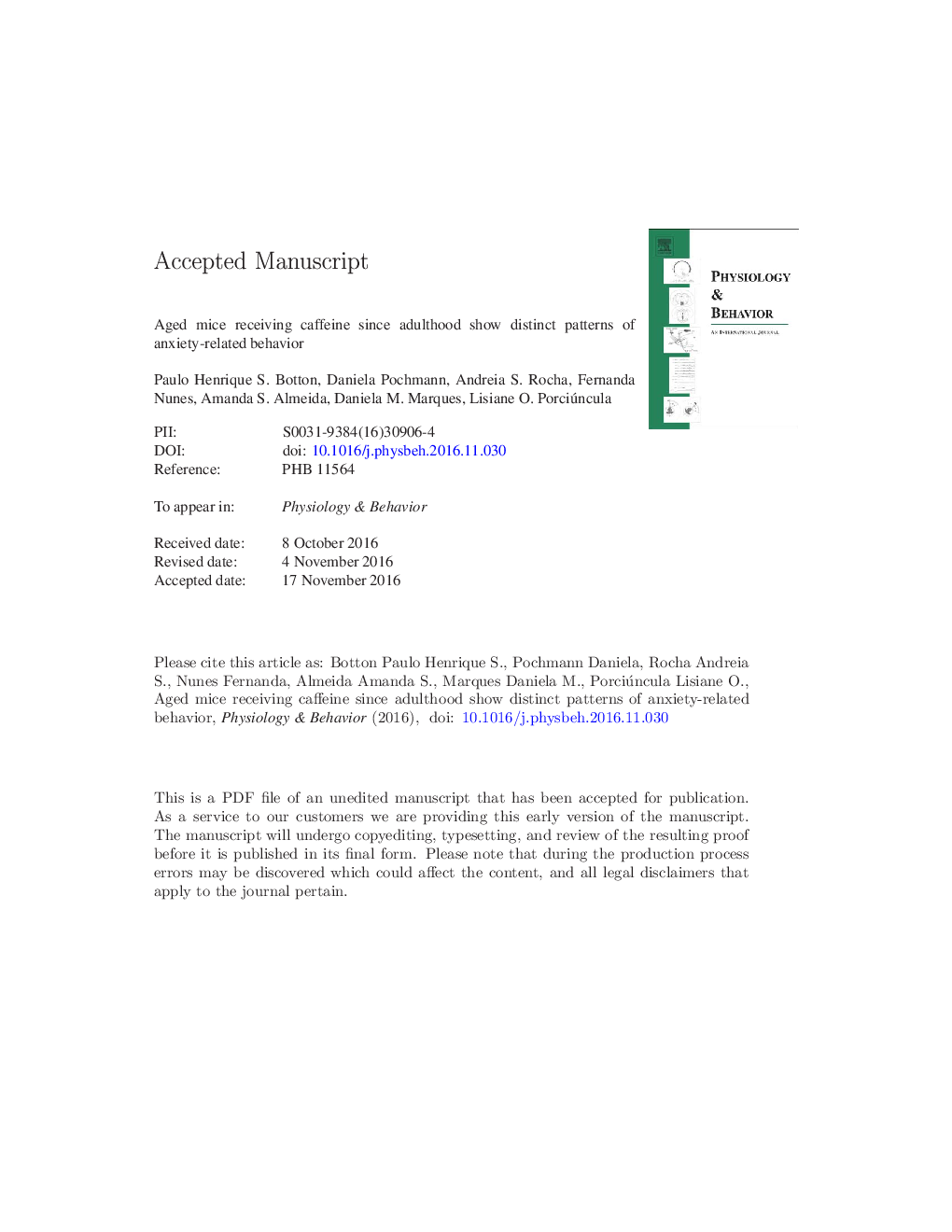| کد مقاله | کد نشریه | سال انتشار | مقاله انگلیسی | نسخه تمام متن |
|---|---|---|---|---|
| 5593798 | 1571149 | 2017 | 37 صفحه PDF | دانلود رایگان |
عنوان انگلیسی مقاله ISI
Aged mice receiving caffeine since adulthood show distinct patterns of anxiety-related behavior
ترجمه فارسی عنوان
موش های سالم که از زمان تولد کافئین دریافت می کنند، الگوهای متمایز رفتار مرتبط با اضطراب را نشان می دهند
دانلود مقاله + سفارش ترجمه
دانلود مقاله ISI انگلیسی
رایگان برای ایرانیان
کلمات کلیدی
موضوعات مرتبط
علوم زیستی و بیوفناوری
بیوشیمی، ژنتیک و زیست شناسی مولکولی
فیزیولوژی
چکیده انگلیسی
Caffeine is the psychostimulant most consumed worldwide. Anxiogenic effects of caffeine have been described in adult animals with controversial findings about its anxiogenic potential. Besides, the effects of caffeine on anxiety with aging are still poorly known. In this study, adult mice (6Â months old) started to receive caffeine (0.3 and 1.0Â mg/mL, drinking water) during 12-14Â months only in the light cycle and at weekdays. The open field (OF) and elevated plus maze (EPM) testing were used to determine the effects of caffeine on anxiety-related behavior in adult and aged mice (18-20Â months old). Because aging alters synaptic proteins, we also evaluated SNAP-25 (as a nerve terminals marker), GFAP (as an astrocyte marker) and adenosine A1 and A2A receptors levels in the cortex. According to the OF analysis, caffeine did not change both hypolocomotion and anxiety with aging. However, aged mice showed less anxiety behavior in the EPM, but after receiving caffeine (0.3Â mg/mL) during adulthood they were anxious as adult mice. While SNAP-25 and adenosine A2A receptors increased with aging, both GFAP and adenosine A1 receptors were not affected. Caffeine at moderate dose prevented the age-related increase of the SNAP-25, with no effect on adenosine A2A receptors. The absence of effect for the highest dose suggests that tolerance to caffeine may have developed over time. Aged mice showed high responsiveness to the OF, being difficult to achieve any effect of caffeine. On the other hand this substance sustained the adult anxious behavior over time in a less stressful paradigm, and this effect was coincident with changes in the SNAP-25, suggesting the involvement of this synaptic protein in the ability of caffeine to preserve changes related to emotionality with aging.
ناشر
Database: Elsevier - ScienceDirect (ساینس دایرکت)
Journal: Physiology & Behavior - Volume 170, 1 March 2017, Pages 47-53
Journal: Physiology & Behavior - Volume 170, 1 March 2017, Pages 47-53
نویسندگان
Paulo Henrique S. Botton, Daniela Pochmann, Andreia S. Rocha, Fernanda Nunes, Amanda S. Almeida, Daniela M. Marques, Lisiane O. Porciúncula,
